Overview
This article delves into the essential differences between caregiver and caretaker roles, highlighting the unique contributions each makes to our loved ones’ well-being. Caregivers offer personal emotional support and assistance with daily activities, ensuring that individuals feel valued and cared for. On the other hand, caretakers concentrate on property maintenance and general oversight, providing a safe and comfortable environment.
Understanding this distinction is crucial for families, as it influences the type of support required for their loved ones. As the demand for personalized care services continues to rise, recognizing these roles can empower families to make informed decisions about the care they seek. We’re here for you, ready to help navigate these important choices.
Introduction
In a world where the demand for personalized care is on the rise, the roles of caregivers and caretakers have become increasingly vital in ensuring the well-being of individuals, especially the elderly and those with chronic illnesses. Since 1980, Best Care Nurses Registry has been a cornerstone in this evolution, providing tailored home health care solutions that truly make a difference. As families navigate the complexities of caregiving, it’s essential to understand the distinct responsibilities and emotional contributions of caregivers versus caretakers.
The landscape of home health care is shifting, influenced by factors such as increased government funding and the rise of telehealth services. It is crucial for families to recognize the unique skill sets and support systems available to them. This article delves into the intricacies of these roles, the challenges faced by caregivers, and the importance of emotional connections in delivering quality care. Ultimately, we aim to guide families toward informed decisions that enhance the quality of life for their loved ones, reinforcing that we’re here for you every step of the way.
Best Care Nurses Registry: Personalized Care Solutions for Caregivers and Caretakers
Since 1980, Best Care Nurses Registry has proudly established itself as a reliable supplier of home health services, dedicated to providing tailored support solutions that meet the unique needs of both caregivers and their loved ones. We emphasize quality and compassion, ensuring that clients receive the essential assistance they require—whether at home, in hospitals, or in assisted living facilities. This commitment to personalized care is vital in distinguishing the roles of caregivers vs caretakers, highlighting the varying degrees of emotional and physical support necessary in different caregiving scenarios.
There has been a remarkable increase in government funding for home healthcare initiatives, particularly Medicaid home and community-based programs, which experienced a substantial 25% rise in funding. This trend underscores the growing recognition of the importance of personalized support in enhancing the quality of life for seniors and individuals with chronic illnesses. Additionally, the rise of telehealth—boasting a 154% increase in usage during the COVID-19 pandemic—has become essential in providing accessible healthcare services. At Best Care Nurses Registry, we leverage telehealth to ensure that patients receive timely assistance without the need for in-person visits, enriching the overall experience.
We illustrate this transition by offering a range of services tailored to meet the distinct needs of our clients. Our caregivers are thoroughly vetted and thoughtfully matched with clients, fostering trust and comfort. This allows families to focus on their personal lives, knowing that their loved ones are in capable hands. Our personalized support consultation process not only alleviates the emotional burden of caregiving but also enhances the overall efficiency of the assistance provided. As home healthcare organizations expand their services to include specialized support for elderly patients, Best Care remains at the forefront, committed to delivering exceptional home health services customized to the evolving needs of the community.
If you have questions or wish to discuss your needs, please call (888) 203-2529. Our friendly staff is here for you, ready to provide the support and care you deserve.
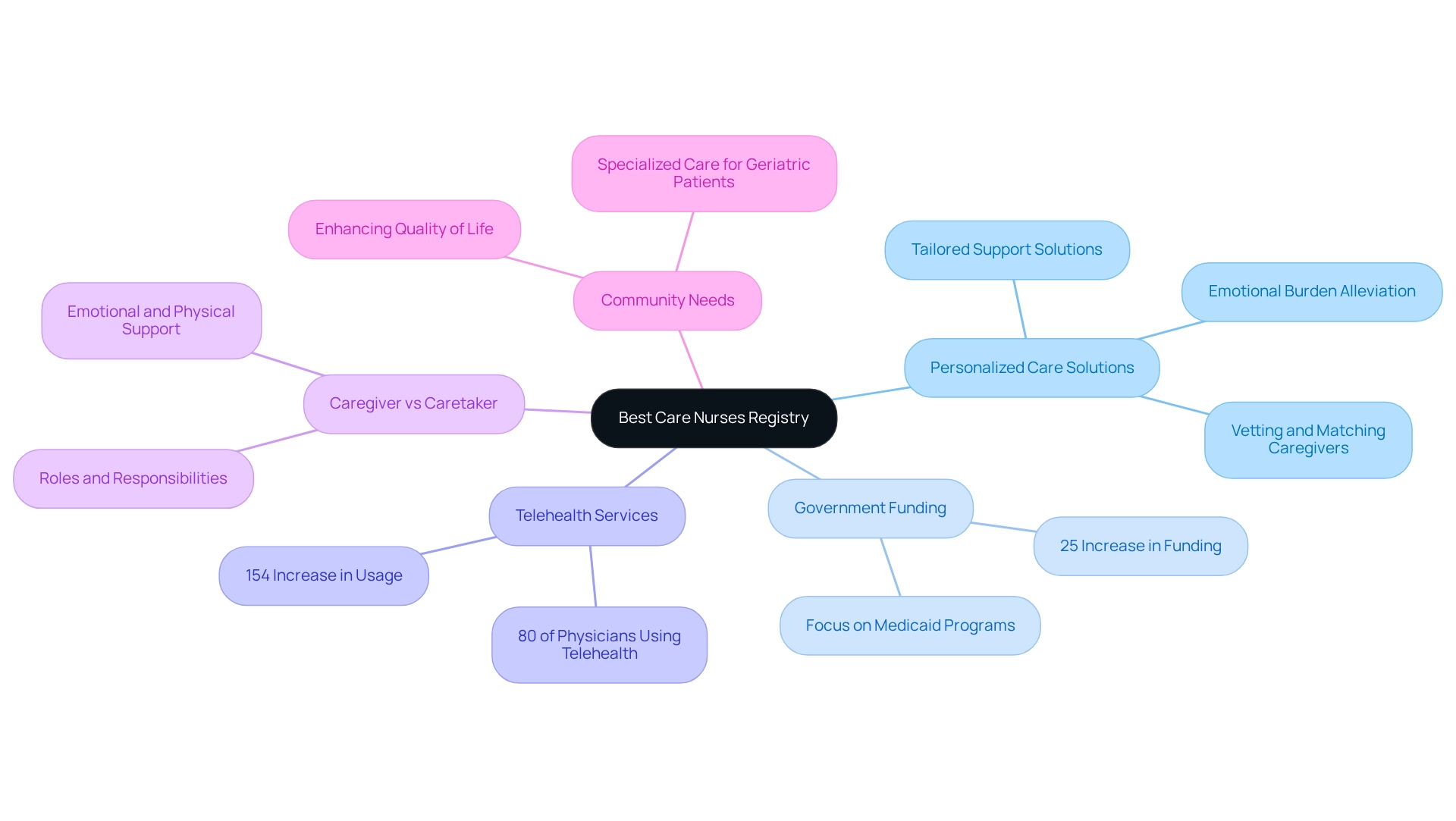
Defining Caregiver and Caretaker: Key Role Distinctions
A provider is defined as a person who offers direct, personal assistance to those in need, such as the elderly or individuals with disabilities. This role encompasses emotional support, companionship, and assistance with daily activities, making it deeply personal and often emotionally taxing. In fact, studies indicate that those who provide care frequently experience significant stress, which can lead to premature aging, potentially reducing their lifespan by up to ten years. Elissa S. Epel from the Department of Psychiatry at the University of California, San Francisco, observes that relatives providing support under extreme stress have been demonstrated to age prematurely.
Conversely, a caretaker typically has a broader range of responsibilities that may include property maintenance and general oversight of individuals’ well-being, but without the same level of personal engagement. Understanding the differences in caregiver vs caretaker roles is crucial for families seeking appropriate support for their loved ones. For example, while caregivers frequently offer crucial emotional support—indicated by a substantial proportion of caregivers as a main role—those who are caretakers may concentrate more on logistical and environmental factors of assistance. This differentiation is particularly important in 2025, as the demand for personalized care continues to rise, highlighting the need for clarity in roles.
Recognizing when a loved one may benefit from companion or sitter services is essential for enhancing their independence and quality of life. Signs such as social isolation, difficulty with daily tasks, or safety concerns can indicate the need for additional support. Real-world examples illustrate these differences: a support provider might assist an elderly person with bathing and medication management, while the distinction of caregiver vs caretaker is evident as one ensures that the home environment is safe and well-maintained. Furthermore, the financial strain of providing care is substantial, with the typical household member assisting someone 50 years or older spending $5,531 each year on out-of-pocket expenses related to care. Additionally, lost wages for women who leave the workforce early due to caregiving responsibilities total $142,693.
By acknowledging these important differences and the related emotional and financial effects, families can make educated choices about the kind of assistance that best fulfills their needs. We’re here for you, and understanding these distinctions can lead to better support for your loved ones, including the adaptable respite services provided by Best Care Nurses Registry.
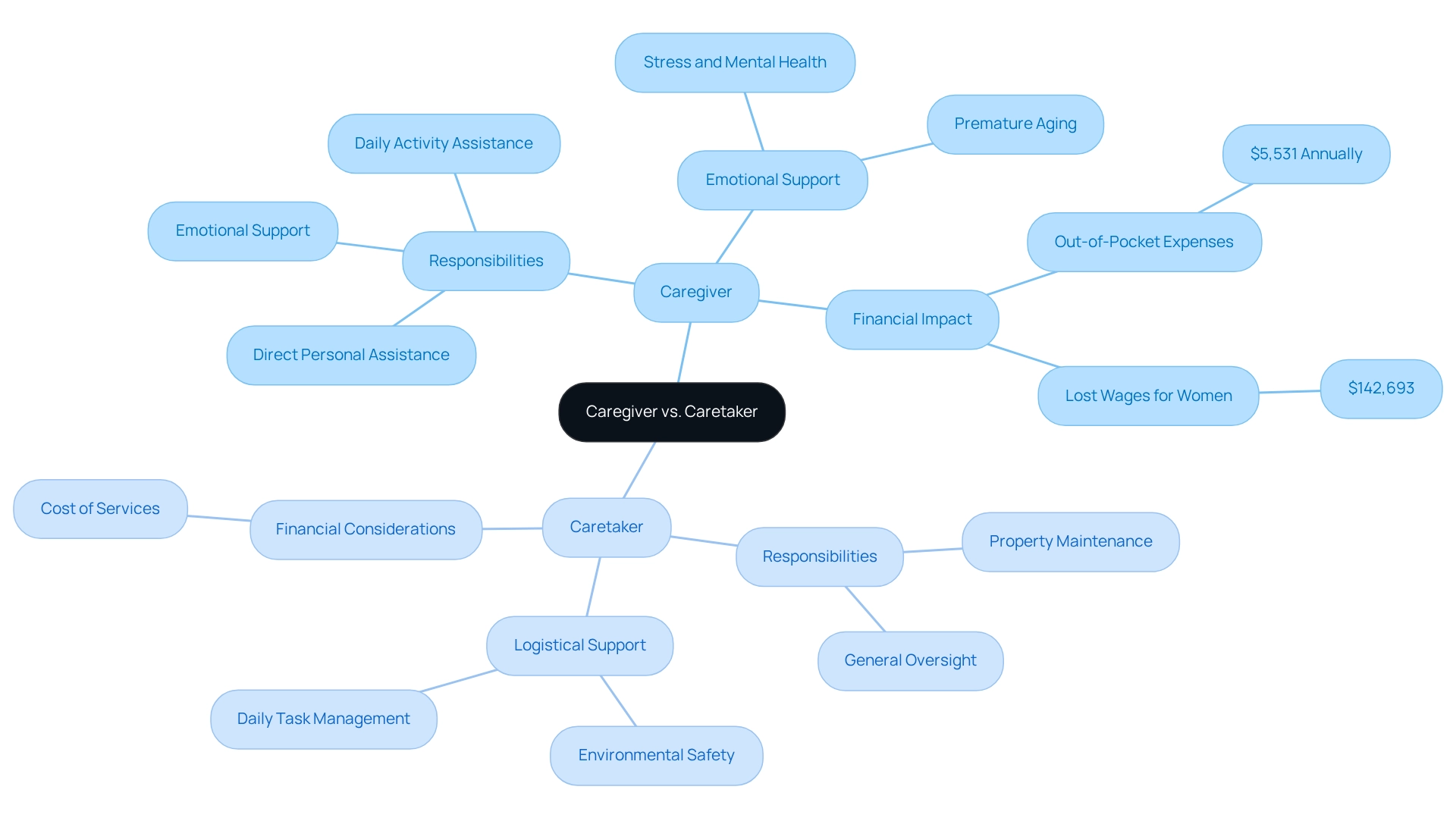
Caregiver Responsibilities: Understanding the Scope of Care
The debate between caregiver vs caretaker highlights the crucial role both play in enhancing the well-being of their clients through a diverse array of responsibilities. Their daily tasks encompass assisting with essential activities such as bathing, dressing, and meal preparation—vital for maintaining the dignity and independence of seniors. Beyond these physical tasks, caregivers provide companionship and emotional support, fostering trust and building meaningful relationships that significantly contribute to the mental health of the individuals they support.
In addition to personal assistance, aides, particularly CNAs (Certified Nursing Assistants) and HHAs (Home Health Aides), are often tasked with managing medications, coordinating medical appointments, and ensuring a safe living environment. CNAs usually undergo more comprehensive training centered on medical duties, while HHAs focus on personal assistance and daily living tasks. This multifaceted role is essential, as studies indicate that effective support for those in need can lead to improved health outcomes and a higher quality of life for clients.
For example, a rising trend indicates that 43% of those providing support now reside with their recipients, reflecting the growing complexity of caregiving dynamics in multigenerational homes. Additionally, the financial burden of providing assistance is substantial; the average individual supporting someone aged 50 or older spends $5,531 annually on out-of-pocket expenses related to assistance, which accounted for over 10% of the median income for a supporter in 2007 (AARP). This statistic highlights the economic difficulties encountered by those providing care and further stresses the significance of their roles.
To ensure quality assistance, it is essential for families to maintain open communication with those offering care and the home care agency. Regular check-ins with loved ones and periodic updates from support providers can help address any concerns promptly. The duties of caregivers vs caretaker are extensive and essential in influencing the overall experience of their clients. As the landscape of home health assistance evolves in 2025, health professionals emphasize the significance of the caregiver vs caretaker roles, acknowledging the profound influence support providers have on client well-being. By offering both physical and emotional aid, caregivers ensure that seniors can uphold their independence while receiving the essential help they need to flourish.
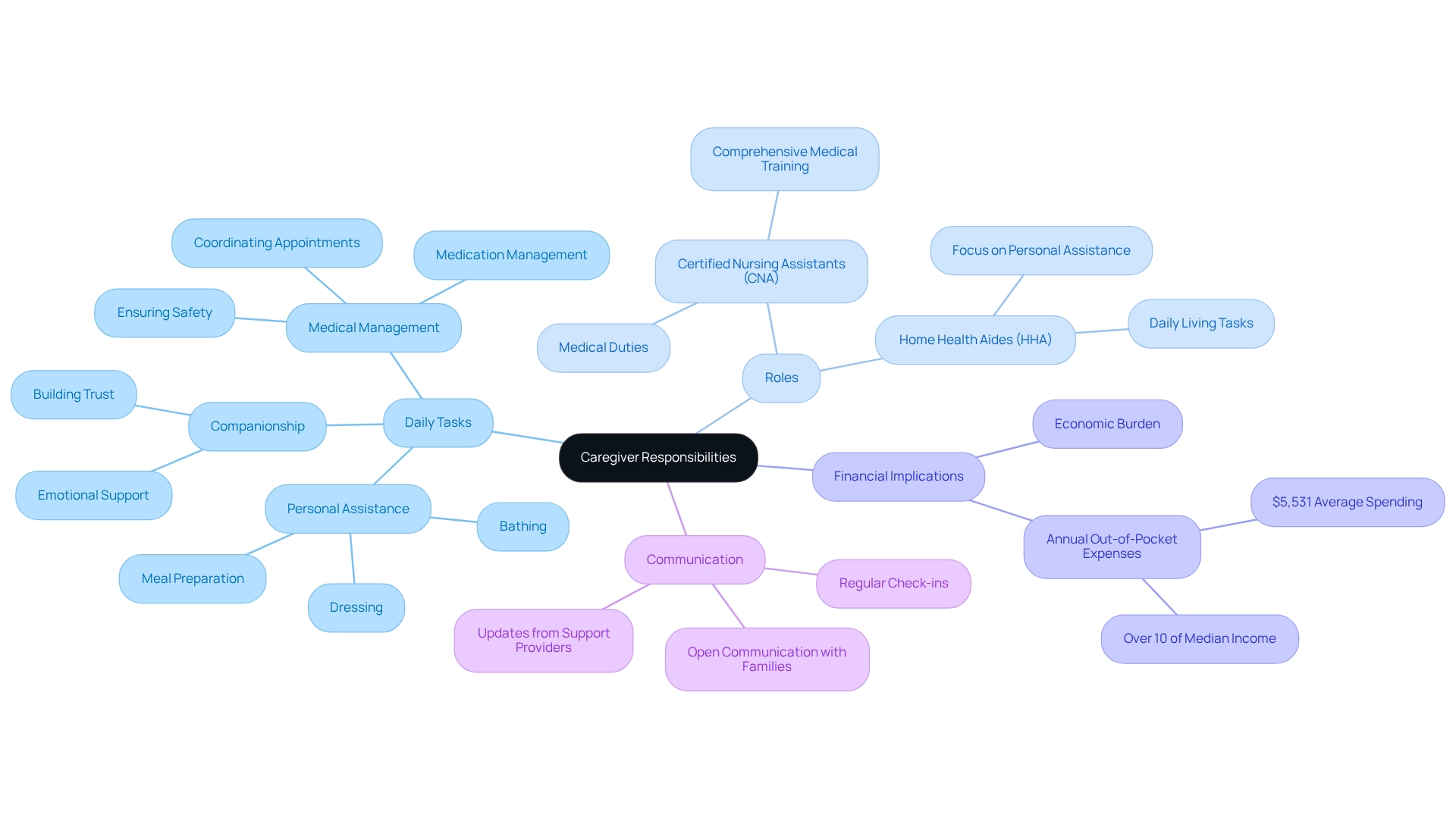
Caretaker Responsibilities: A Closer Look at Their Role
Caretakers play a crucial role in the maintenance and upkeep of properties or facilities, encompassing tasks such as cleaning, gardening, and performing minor repairs. In the area of personal assistance, their duties may include helping individuals with mobility and fundamental needs; however, they usually do not provide the same level of emotional support as those classified under caregiver vs caretaker who offer personal aid. This distinction between caregiver vs caretaker is essential, as caregivers guarantee that the environment stays secure and supportive of the well-being of those receiving assistance. This allows support providers to focus on the more personal elements of care, ensuring that every individual feels valued and understood.
The importance of property maintenance in caregiving cannot be overstated. A well-maintained environment significantly contributes to the overall quality of life for individuals, particularly seniors and those with chronic illnesses. For instance, a study involving 1,765 adults emphasized that effective home environments, which include proper maintenance, lead to improved health outcomes and emotional well-being. Moreover, the economic influence of providing care is significant, with the worth of family members’ services estimated at $306 billion each year. This highlights the essential role that providers play in supporting these efforts, reinforcing the idea that care goes beyond just physical assistance.
Furthermore, expert opinions underscore the necessity of caretakers in maintaining safe environments. As noted by property maintenance specialists, “A clean and well-kept space is foundational to health and safety, especially for vulnerable populations.” This perspective reinforces the idea that the distinction between caregiver vs caretaker is integral to creating a supportive atmosphere that enhances the effectiveness of caregiving, ensuring that every individual feels secure and cared for.
In the context of customized domestic support services, such as those offered by Best Care Nurses Registry, the comparison of caregiver vs caretaker roles becomes even more significant. CNA/HHA services not only assist with daily living activities but also offer emotional support and companionship, which are crucial for enhancing the quality of life and independence of seniors. Enhanced health results, improved nutrition, and emotional wellness are merely a few of the advantages that emerge from this personalized support strategy, reminding us that every little bit of care counts.
In summary, caretakers are essential not only for their practical skills in home maintenance but also for their role in fostering safe and nurturing environments. Their contributions enable support providers to concentrate on offering personalized assistance, ultimately enhancing the quality of life for those they serve. Remember, we’re here for you, and your comfort is our priority.
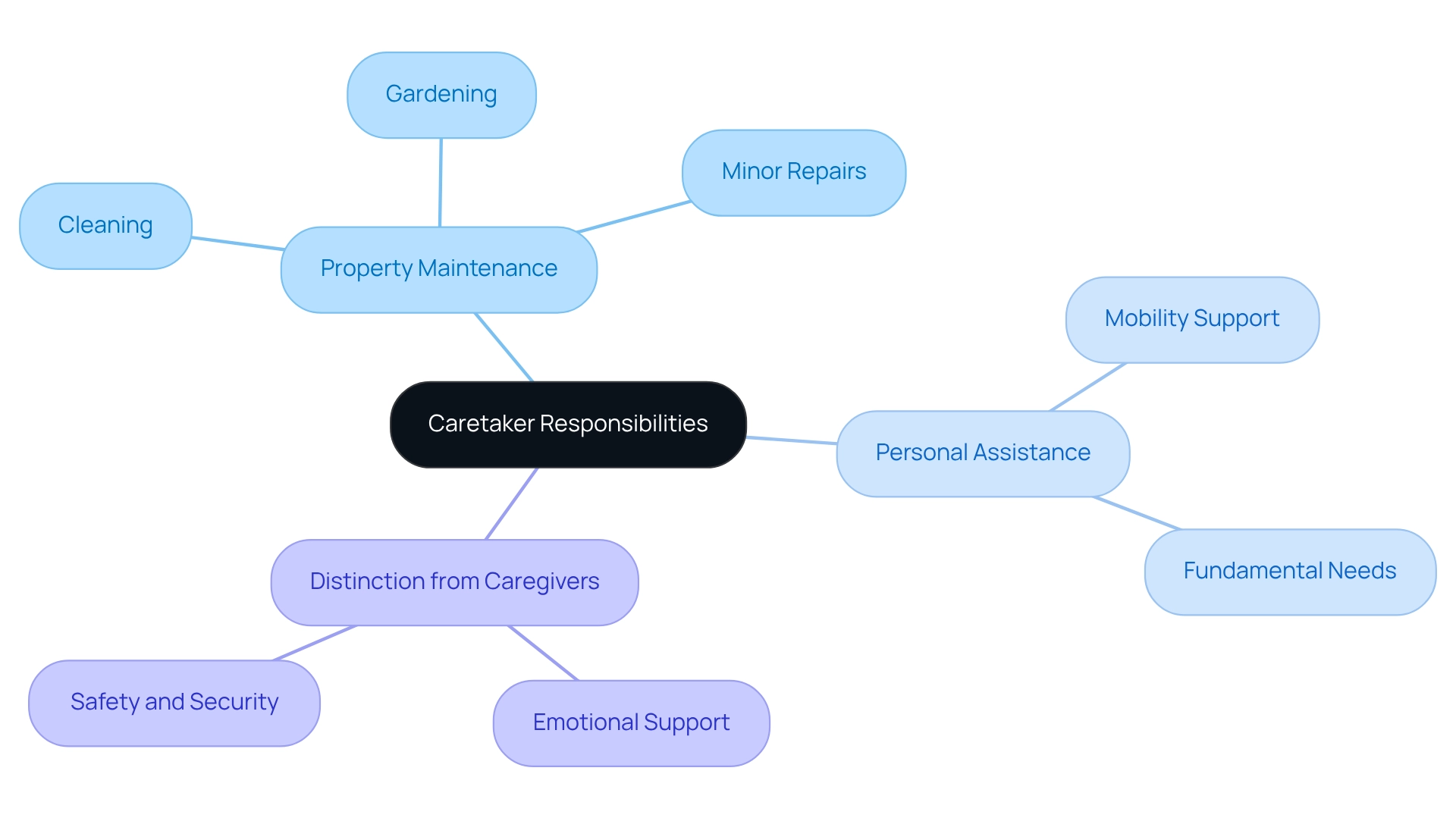
Emotional Connections: The Caregiver’s Role in Building Relationships
A pivotal aspect of the caregiver vs caretaker’s role is the emotional connection they cultivate with their clients. This relationship is foundational for establishing trust, which is vital for effective caregiver vs caretaker interactions. In the discussion of caregiver vs caretaker, it is clear that caregivers often serve as confidants and companions, offering not just physical assistance but also essential emotional support. Such bonds can profoundly enhance clients’ quality of life, highlighting the differences in roles between caregiver vs caretaker, and making them feel valued and understood.
Studies show that tailored support greatly enhances patient satisfaction, highlighting the significance of emotional bonds in assistance. Best Care Nurses Registry, operating in South Florida since 1980, helps 300,000 households annually in locating the appropriate senior assistance, emphasizing the importance of individualized support and the emotional bonds that providers establish with clients. For families, choosing a provider who emphasizes these emotional ties can lead to improved outcomes for their loved ones, particularly when considering the differences between caregiver vs caretaker.
Furthermore, it’s crucial to acknowledge the difficulties that those who provide support encounter. In fact, 47% report yearly household earnings below $50,000, which can affect their emotional health and the standard of assistance they deliver. As Chloe Clark, a copywriter for OurParents, notes, “It can be easy to neglect your own health care needs because you are busy. However, it is essential to stay healthy.” This highlights the necessity for those providing care to prioritize their well-being to effectively assist their clients.
Moreover, a report from the National Family Caregivers Association emphasizes the significant economic contribution of family supporters, estimated at $306 billion each year, illustrating the vital role they fulfill in the healthcare system. As providers build trust and emotional connections, they not only support their clients’ physical needs but also contribute to their overall well-being, illustrating the significance of emotional support in the context of caregiver vs caretaker roles.
At Best Care Nurses Registry, we provide customized support matching services to ensure that your loved one receives compassionate assistance tailored to their unique needs. Our clients have shared their positive experiences, such as one family stating, “The support person matched with my mother was not only skilled but also formed a wonderful bond with her, making her feel less lonely.” This is the kind of connection we strive to create.
Reach out to us today to discover more about how our matching process operates and to find the ideal provider for your loved one.
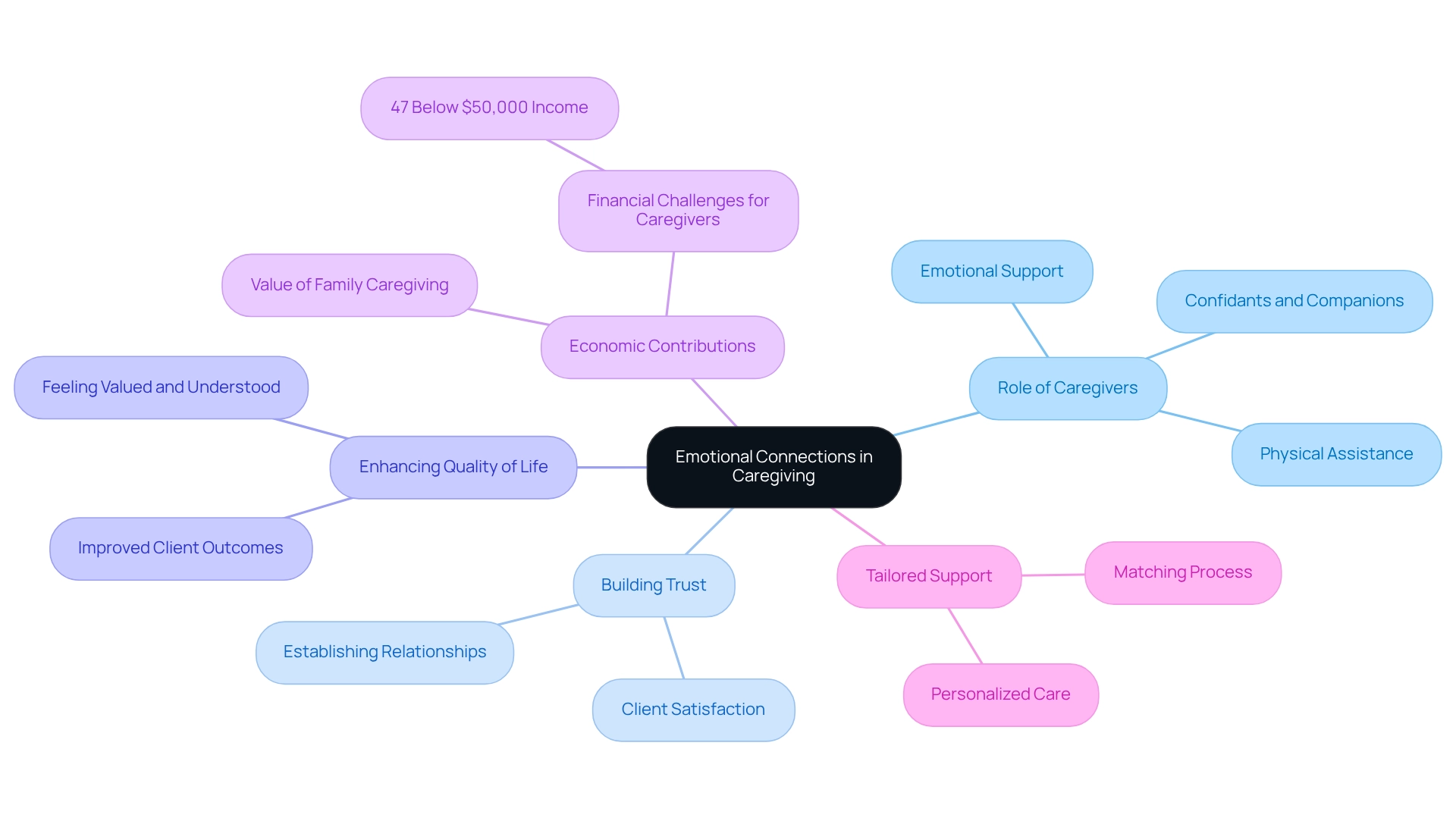
Legal Considerations: Navigating Caregiver and Caretaker Regulations
Navigating the legal landscape can be daunting for both providers and those involved in the caregiver vs caretaker debate. It’s essential to address various considerations, such as contracts, liability, and compliance with health regulations. In the discussion of caregiver vs caretaker roles, it’s important to note that caregivers, especially those in professional positions, often face specific licensing and training standards that can vary by state. For instance, regulations impacting home health service providers determine the qualifications required for attendants to operate legally and efficiently.
Families should familiarize themselves with these legal structures to ensure that the assistance offered is not only effective but also compliant with relevant laws. This understanding can significantly influence the quality of support received and protect families from potential legal challenges.
Statistics reveal that a notable percentage of family helpers—23% of those assisting loved ones for five years or more—describe their health as fair or poor. This highlights the emotional and physical strain of caregiving. It underscores the importance of ensuring that those providing care are adequately supported and trained to meet both their clients’ needs and their legal obligations. Legal compliance is vital not just for the protection of support providers but also for the well-being of those they assist.
Moreover, the Best Care Concierge Program offers valuable resources by connecting clients with experienced experts in legal and financial matters, such as attorneys and financial consultants. This comprehensive support helps families navigate the complexities of caregiving while ensuring adherence to legal standards. The program provides access to legal consultations and financial planning support, which are crucial for addressing the specific challenges faced by caregivers.
Case studies, including those involving traveling providers, illustrate the unique challenges encountered in various caregiving scenarios. A national survey by AARP emphasizes the need for improved accommodations for these support providers, suggesting that further research is necessary to meet their specific legal and practical needs. These challenges often intersect with legal considerations, as the distinction between caregiver vs caretaker requires navigating regulations that may not account for their individual circumstances. By understanding these legal aspects, families can make informed decisions about their care options, fostering a safer and more compliant caregiving environment.
Additionally, it’s important to consider the financial aspects of caregiving. State paid family leave regulations typically impose limits on benefit amounts, impacting the financial assistance available to caregivers. This highlights the need for robust legal systems that not only address compliance but also provide adequate support for those who care for others. As Lea Muir noted, over 70% of caregivers support proposed policy changes aimed at reducing out-of-pocket expenses and burnout, indicating a strong desire for enhanced legal protections and support systems. By addressing these legal factors, families can more effectively manage the intricacies of caregiving, ensuring that their loved ones receive the highest quality of support.
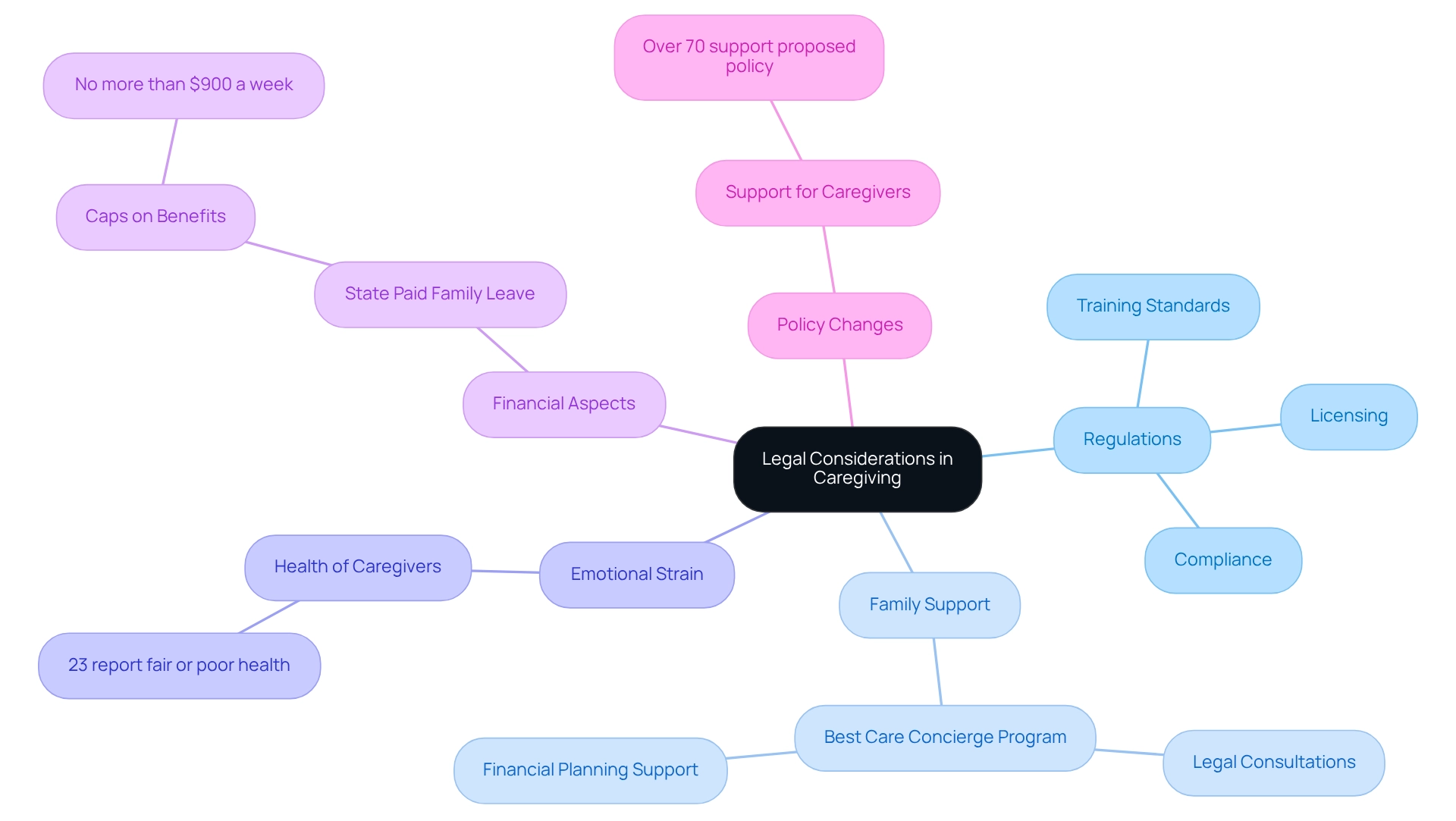
Overlap in Roles: Can a Caregiver Also Be a Caretaker?
In numerous situations, providers naturally transition into roles as a caregiver vs caretaker, particularly in domestic support settings. This duality fosters a comprehensive approach to care, enabling providers to effectively address both emotional and physical needs. For instance, Certified Nursing Assistants (CNAs) and Home Health Aides (HHAs) play vital roles in assisting patients with daily activities, such as personal hygiene, dressing, and meal preparation. Both CNAs and HHAs offer hourly services, allowing families to tailor assistance to their loved ones’ specific needs without a minimum requirement.
A provider who also manages household tasks can create a more integrated experience for clients, enhancing their overall well-being. However, it is crucial for families to recognize the unique skills and training required for each position to ensure their loved ones receive the highest quality of support. CNAs typically undergo more extensive training focused on medical responsibilities, while HHAs concentrate on personal assistance and daily living tasks.
Statistics show that 22% of family supporters face challenges in communicating with healthcare providers, underscoring the importance of maintaining open dialogue with both the supporter and the home care agency to ensure quality care. Furthermore, case studies highlight the experiences of young individuals who often juggle their caregiving responsibilities with personal commitments, facing unique challenges such as balancing schoolwork and caregiving tasks. This illustrates the need for tailored support systems that address their specific circumstances.
Moreover, it’s significant that 15% of eldercare providers have been offering support for ten years or more, showcasing the depth of experience these individuals bring to their dual roles. By understanding the interplay between support provider roles and the distinctions in caregiver vs caretaker responsibilities, families can more effectively navigate the complexities of home health services, ensuring their loved ones receive compassionate and comprehensive assistance. Remember, we’re here for you, and your comfort is our priority.
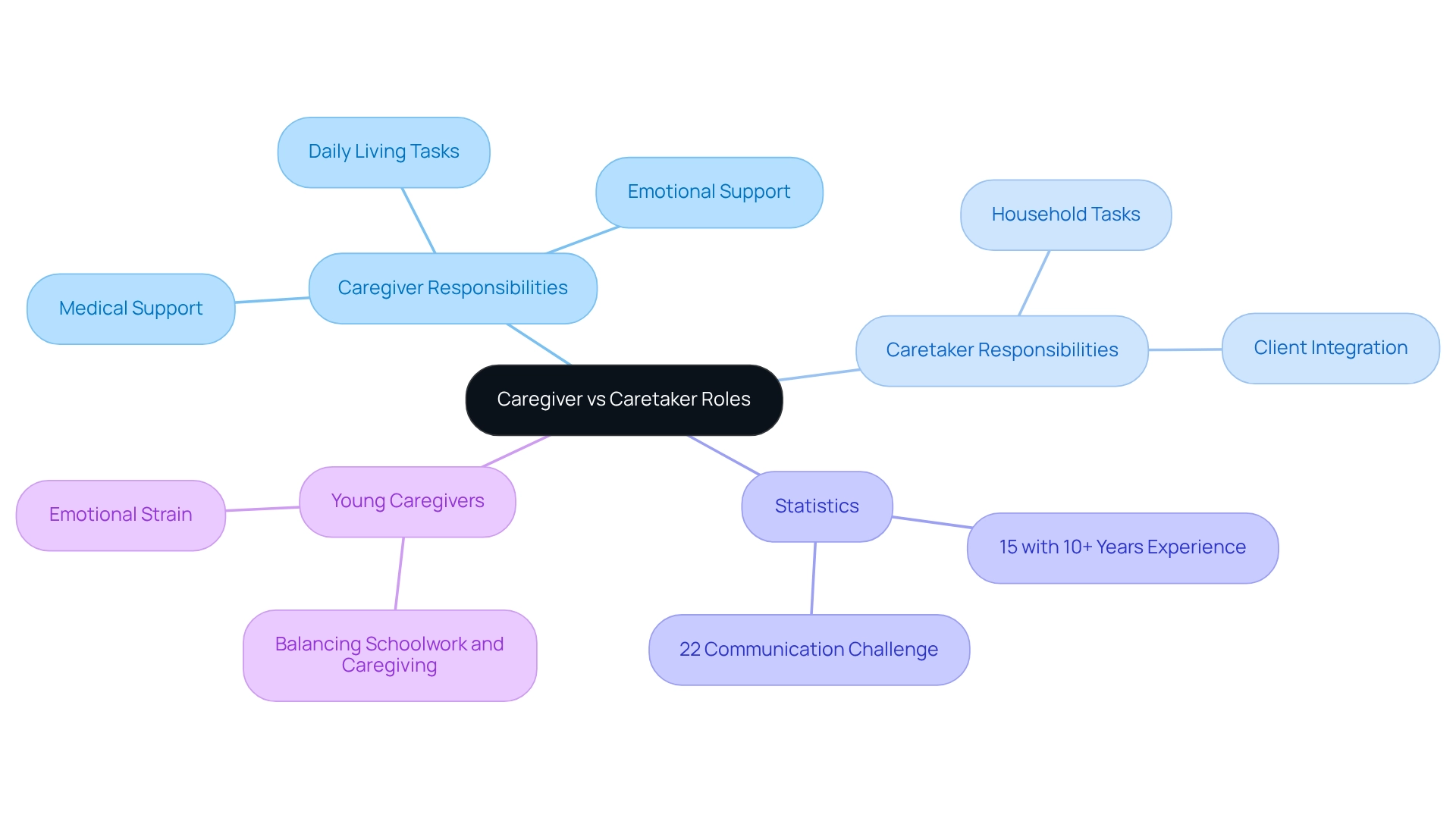
Skills and Qualifications: What Makes an Effective Caregiver or Caretaker?
Efficient providers and attendants possess a unique range of abilities that are vital for delivering exceptional support. Caregivers, including Certified Nursing Assistants (CNAs) and Home Health Aides (HHAs), must demonstrate:
- Empathy
- Strong communication skills
- Patience
- Effective stress management
A foundational understanding of medical needs and emergency procedures is crucial, enabling caregivers to respond appropriately in critical situations. While CNAs typically undergo more extensive training focused on medical duties, HHAs concentrate on personal assistance and daily living tasks, such as bathing, grooming, and meal preparation. Families should prioritize these essential skills when selecting a caregiver vs caretaker, as the right abilities can significantly enhance the quality of support received. Recent statistics reveal that 12% of individuals providing care experience a depletion of their long-term savings due to the financial strain of caregiving. This underscores the importance of choosing qualified professionals who can help alleviate some of this burden.
Training programs for caregiving roles are increasingly emphasizing these essential skills, with many organizations advocating for ongoing education and certification. For instance, programs that integrate both medical and practical skills are becoming more prevalent, ensuring that caregivers are well-prepared to face the various challenges they may encounter. Specific training programs, like those offered by Best Care Nurses Registry, highlight both the medical and emotional aspects of support, equipping providers to deliver comprehensive assistance.
Given the rising demand for home services, particularly as more Medicare Advantage plans include in-home support, the qualifications of providers are receiving greater attention. This trend emphasizes the need for families to seek support providers who not only possess the necessary skills but also exhibit a commitment to continuous improvement and adaptability in their roles. As noted by industry experts, the evolving nature of caregiving highlights the importance of selecting professionals who are skilled at utilizing technology to enhance care quality.
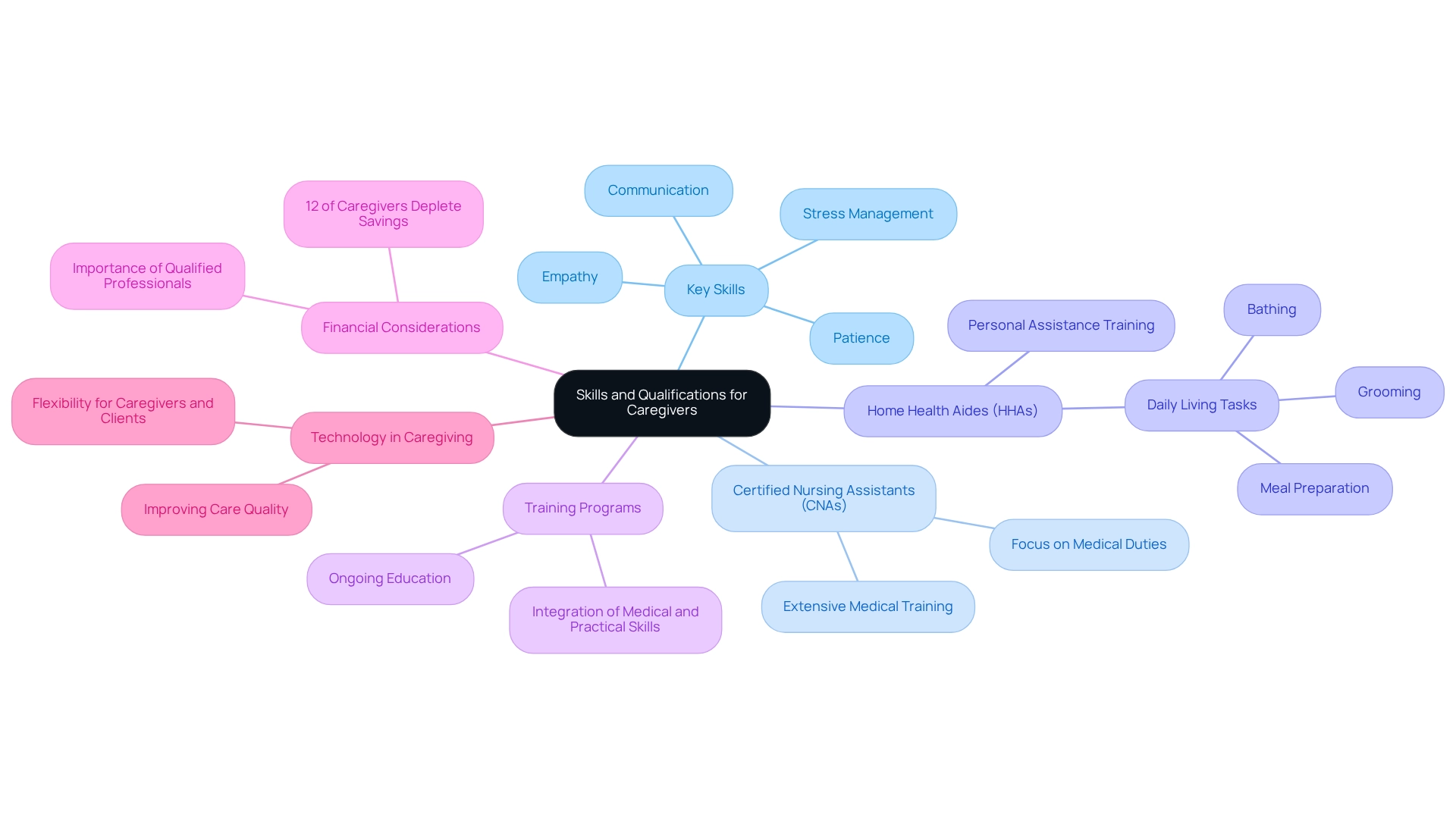
Challenges in Caregiving: Addressing the Emotional Toll on Caregivers
The experience of caregiving can be incredibly rewarding, but it often comes with significant challenges that impact mental health, especially when considering the differences in roles between caregiver vs caretaker. In the discussion about caregiver vs caretaker, it is noted that caregivers frequently encounter emotional stress, physical exhaustion, and a heightened risk of burnout. A recent study revealed that 79% of individuals providing care reported receiving help from healthcare professionals during health issues. This underscores the critical need for external assistance to mitigate the emotional toll they face. Despite this support, many individuals in the caregiver vs caretaker role still feel isolated and anxious, which can worsen their emotional burden.
To address these challenges, it is essential for those in the caregiver vs caretaker position to seek help. Families should actively encourage those providing care to take breaks, access resources, and connect with assistance groups. Participating in self-care activities can greatly decrease the likelihood of hospital stays and reduce mortality rates among those involved in caregiver vs caretaker roles. For instance, dedicating just 100 hours each year to assist friends or family can promote a sense of well-being, emphasizing that even minor gestures of support can significantly impact the emotional health of caregivers.
Furthermore, understanding the payment options for home health care services can alleviate some financial pressure. Best Care Nurses Registry accepts most Long Term Care insurances directly, allowing caregivers to focus on their loved ones without the burden of upfront costs. By completing an Assignment of Benefits (AOB), caregivers can direct their insurance to pay Best Care directly. This streamlines the process and enables immediate access to essential services such as bathing, grooming, toileting, transferring, light housekeeping, meal preparation, medication reminders, and companionship. This assistance can be vital, especially since Medicare does not cover many activities of daily living that private duty aides offer.
Case studies highlight the importance of seeking help. One study indicated that caregivers often overlook the assistance available from friends and family, leading to feelings of isolation. Encouraging caregivers vs caretakers to seek help, even for small tasks, can provide significant relief and enhance their overall experience in caregiving. Mental health experts emphasize that acknowledging the emotional difficulties of caregiving is crucial for preserving the well-being of both the caregiver vs caretaker and the recipient. Additionally, it is important to recognize that many live-in support providers may be unpaid during specific hours, which adds to their emotional and financial pressures.
By fostering a supportive atmosphere and utilizing available resources, such as those from Best Care Nurses Registry, families can help caregivers navigate the complexities of their roles while preserving their mental health. Remember, we’re here for you, and your comfort is our priority.
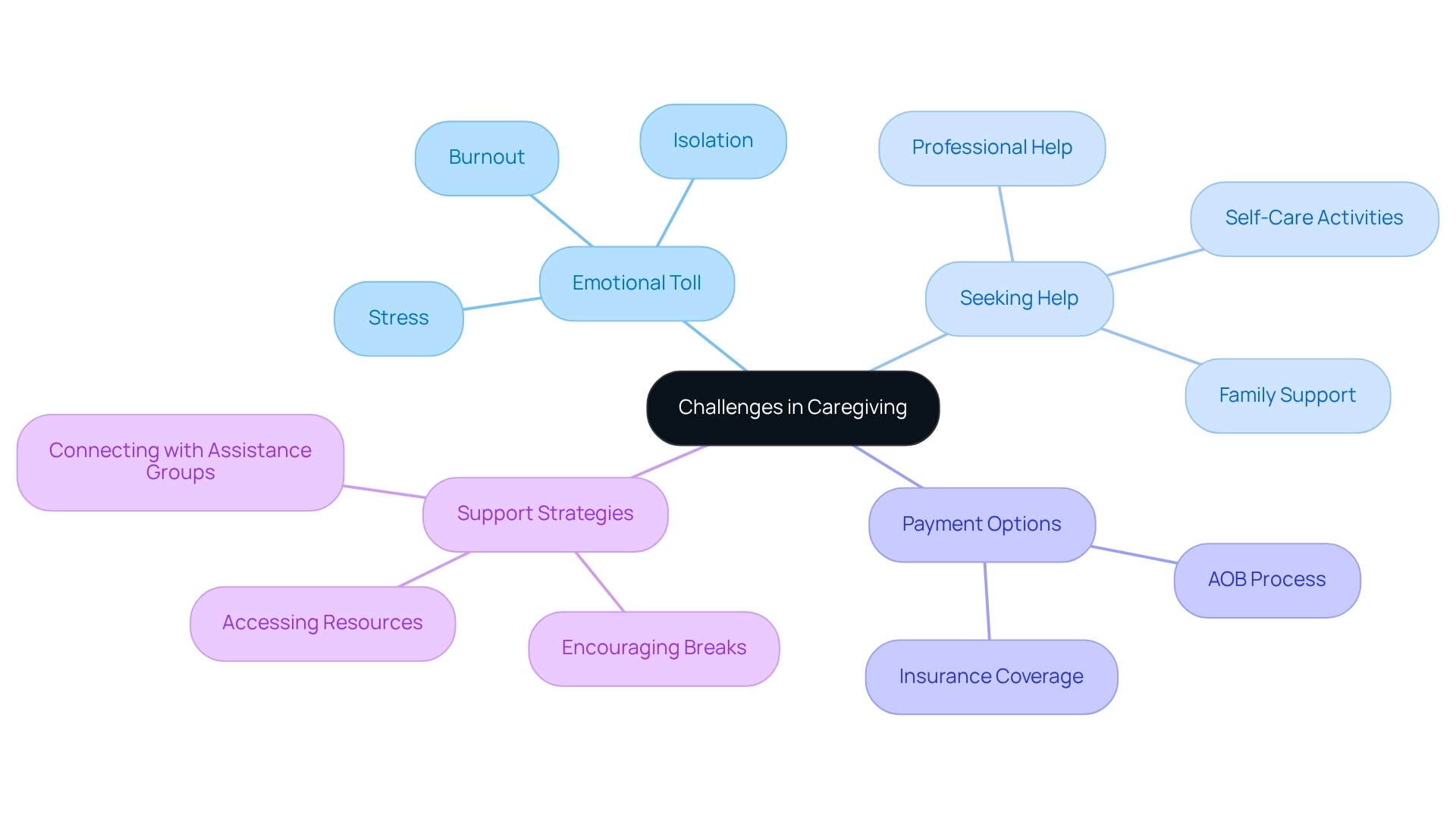
Caregiver vs. Caretaker: Weighing the Benefits and Drawbacks
When families consider the roles of support providers, it’s essential to thoughtfully evaluate the unique advantages and disadvantages of caregiver vs caretaker. Caregivers offer personalized emotional support, significantly enhancing the quality of life for clients. This emotional bond often leads to improved mental health, as those providing support help alleviate feelings of loneliness and isolation. Best Care Nurses Registry highlights this individualized approach, guiding families through a straightforward three-step process to connect with compassionate assistants tailored to their specific needs.
- Step 1 involves reaching out to discuss your needs with welcoming staff.
- Step 2 includes collaborating with your doctor to create a care plan.
- Finally, Step 3 allows families to choose from recommended providers who best suit their situation.
However, the demands of caregiving can be substantial, with many individuals in this role facing burnout. Studies indicate that only 25% report good physical health, and even fewer—just 23%—indicate good mental health. This underscores the importance of recognizing the potential toll caregiving can take on one’s health. Additionally, 2% of caregivers experience eviction or foreclosure, highlighting the financial strains that may accompany this role; in contrast, the distinction of caregiver vs caretaker is evident as caretakers primarily focus on essential maintenance and assistance tasks, fostering a safe and functional environment for their clients.
Although they might not engage as deeply on an emotional level, their role is crucial in ensuring that daily needs are met, which can alleviate some stress for family members. Families should reflect on their specific needs—whether they prioritize emotional support or practical assistance—to determine which role aligns best with their loved ones’ requirements in the caregiver vs caretaker discussion.
Financially, the implications of caregiving can be significant. The average household supporter spends about $5,531 each year from personal funds, with female supporters facing greater financial losses than males, estimated at $324,044 compared to $283,716. Furthermore, 47% of caregivers have an annual household income of less than $50,000, illustrating the economic challenges faced by these individuals. These statistics emphasize the necessity for families to assess their financial circumstances alongside their caregiver vs caretaker needs.
Ultimately, the decision between a support provider and a caregiver vs caretaker should be guided by a comprehensive evaluation of family dynamics, emotional needs, and financial capacities. By understanding the unique contributions and challenges of each role, families can make informed choices that best support their loved ones. The stress of caregiving can lead to increased anxiety and a higher incidence of substance abuse among caregivers, further emphasizing the importance of considering mental health impacts when making this decision.
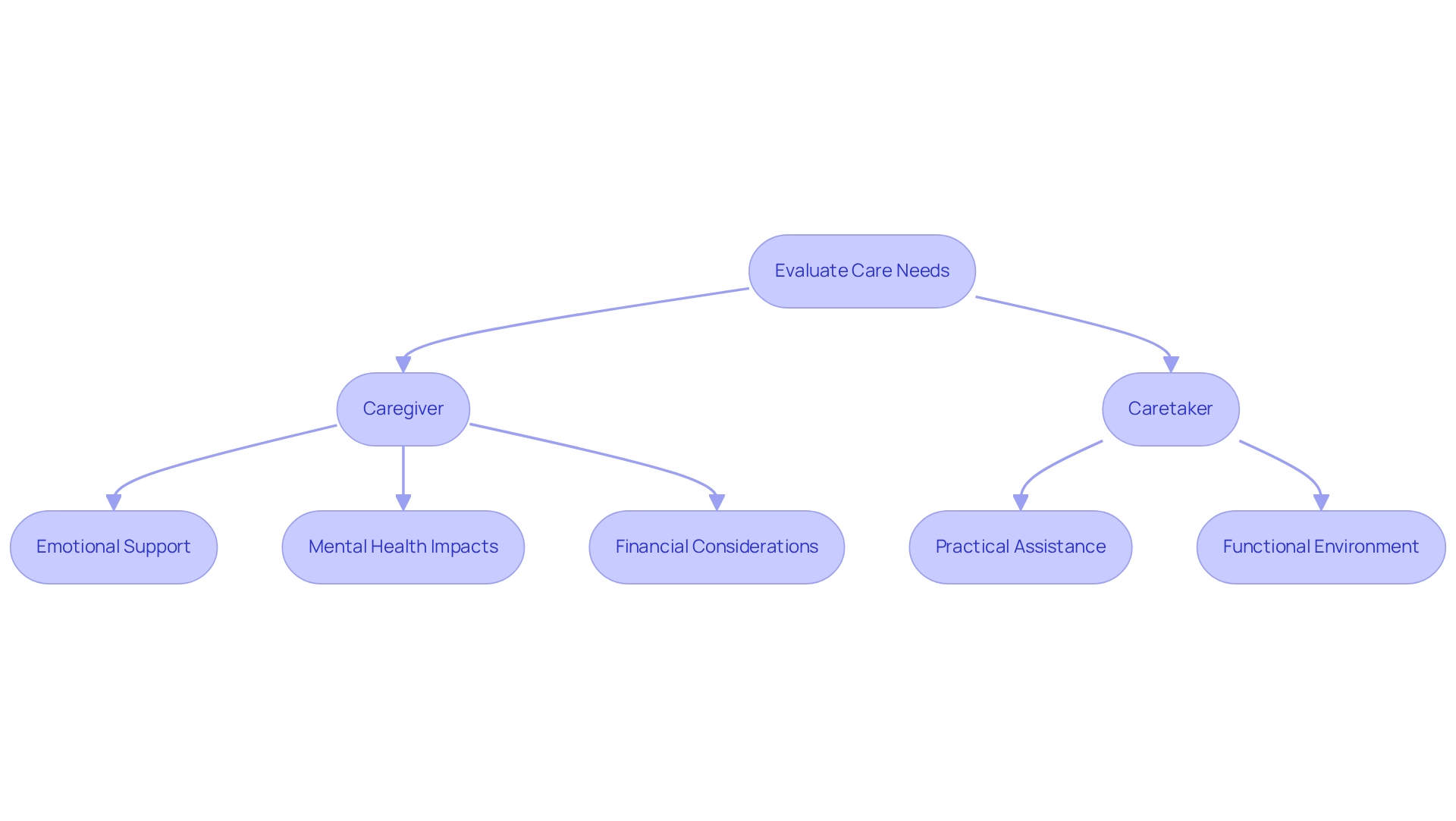
Conclusion
The evolving landscape of home health care highlights the vital roles that caregivers and caretakers play in supporting individuals, especially the elderly and those with chronic illnesses. Best Care Nurses Registry stands out as a leader in providing personalized care solutions, emphasizing the importance of emotional connections and tailored support. As families navigate the complexities of caregiving, it is essential to understand the distinct responsibilities of caregivers versus caretakers. Caregivers offer direct, personal care and emotional support, while caretakers focus on the logistical and environmental aspects of care.
Recognizing the challenges faced by caregivers, including significant emotional and financial burdens, is crucial for families seeking appropriate support. The increasing demand for personalized care, fueled by government funding and advancements like telehealth, underscores the need for families to make informed decisions that prioritize the well-being of their loved ones. By understanding the unique skill sets and emotional contributions of both roles, families can enhance the quality of life for those they care for.
In conclusion, the choice between a caregiver and a caretaker should be guided by a thorough assessment of emotional needs, practical requirements, and financial considerations. The journey of caregiving is not only about meeting physical needs but also about fostering meaningful connections and ensuring that individuals feel valued and supported. At Best Care Nurses Registry, we are committed to helping families find the right care solutions, reinforcing that personalized, compassionate care is vital for enhancing the lives of those in need. We’re here for you, ensuring that your loved ones receive the care they deserve.
Frequently Asked Questions
What services does Best Care Nurses Registry provide?
Best Care Nurses Registry offers home health services tailored to the unique needs of caregivers and their loved ones. This includes assistance at home, in hospitals, and in assisted living facilities, emphasizing quality and compassion.
How has government funding for home healthcare changed recently?
There has been a significant increase in government funding for home healthcare initiatives, particularly a 25% rise in Medicaid home and community-based programs, highlighting the growing recognition of personalized support for enhancing the quality of life for seniors and individuals with chronic illnesses.
What role does telehealth play in Best Care Nurses Registry’s services?
Best Care Nurses Registry leverages telehealth to provide accessible healthcare services, ensuring that patients receive timely assistance without needing in-person visits.
How does Best Care Nurses Registry match caregivers with clients?
Caregivers at Best Care Nurses Registry are thoroughly vetted and thoughtfully matched with clients to foster trust and comfort, allowing families to focus on their personal lives.
What is the difference between a caregiver and a caretaker?
A caregiver provides direct personal assistance, emotional support, and companionship, often engaging deeply with clients. In contrast, a caretaker has broader responsibilities that may include property maintenance and general oversight without the same level of personal engagement.
Why is understanding the difference between caregiver and caretaker roles important?
Understanding the differences is crucial for families seeking appropriate support for their loved ones, as caregivers focus on emotional support while caretakers handle logistical and environmental aspects of care.
What are some signs that a loved one may need companion or sitter services?
Signs include social isolation, difficulty with daily tasks, or safety concerns, indicating the need for additional support to enhance their independence and quality of life.
What financial implications are associated with providing care?
The average household member assisting someone aged 50 or older spends about $5,531 annually on out-of-pocket expenses related to care, and women who leave the workforce early due to caregiving responsibilities lose an estimated $142,693 in wages.
How can families ensure quality assistance for their loved ones?
Families can maintain open communication with caregivers and regularly check in with their loved ones to address any concerns promptly, ensuring quality assistance.
What is the significance of the caregiver vs caretaker roles in the context of home health assistance?
The caregiver vs caretaker roles are essential in influencing the overall experience and well-being of clients, as caregivers provide both physical and emotional aid, helping seniors maintain their independence while receiving necessary support.











